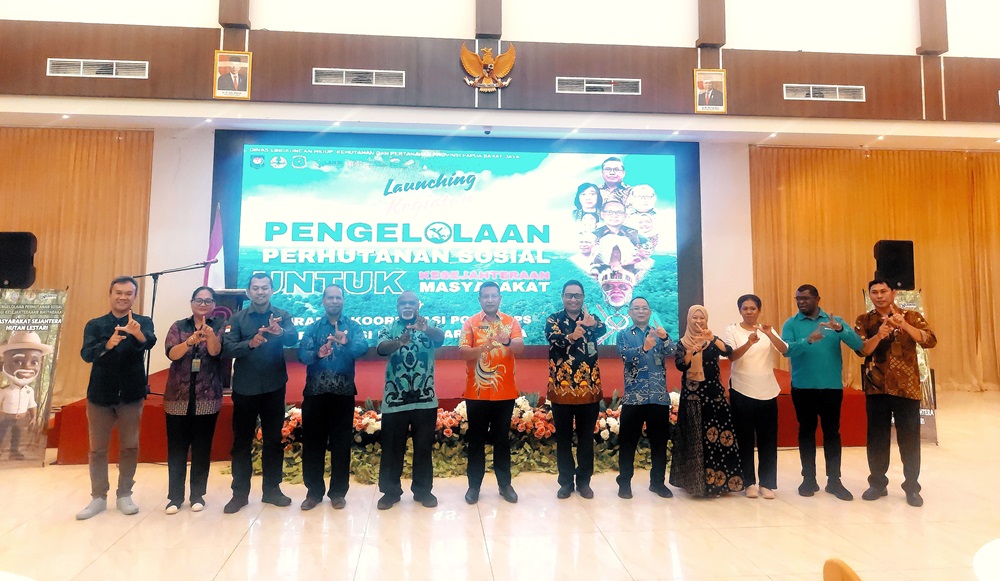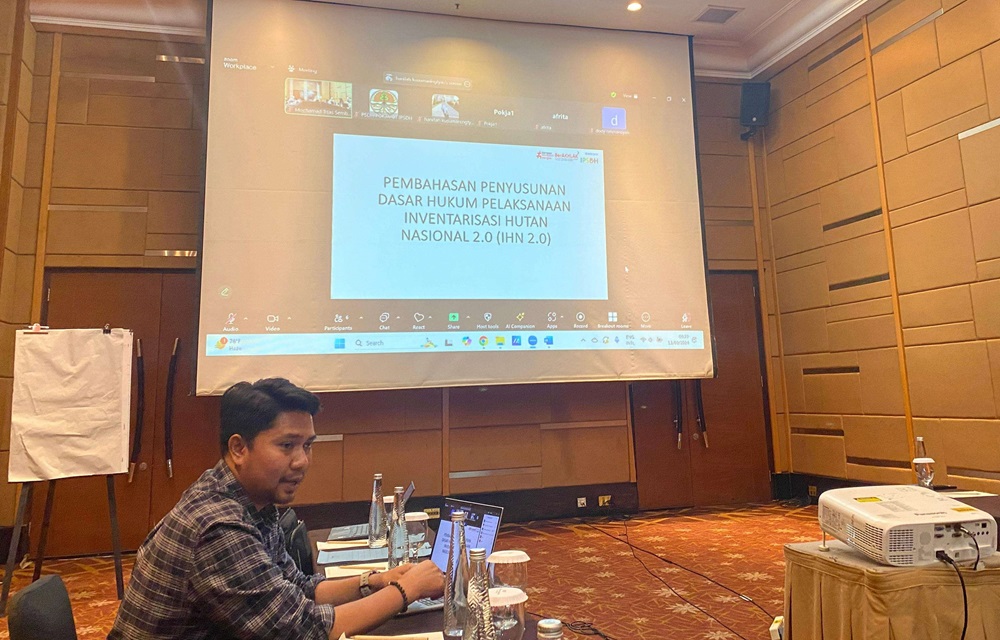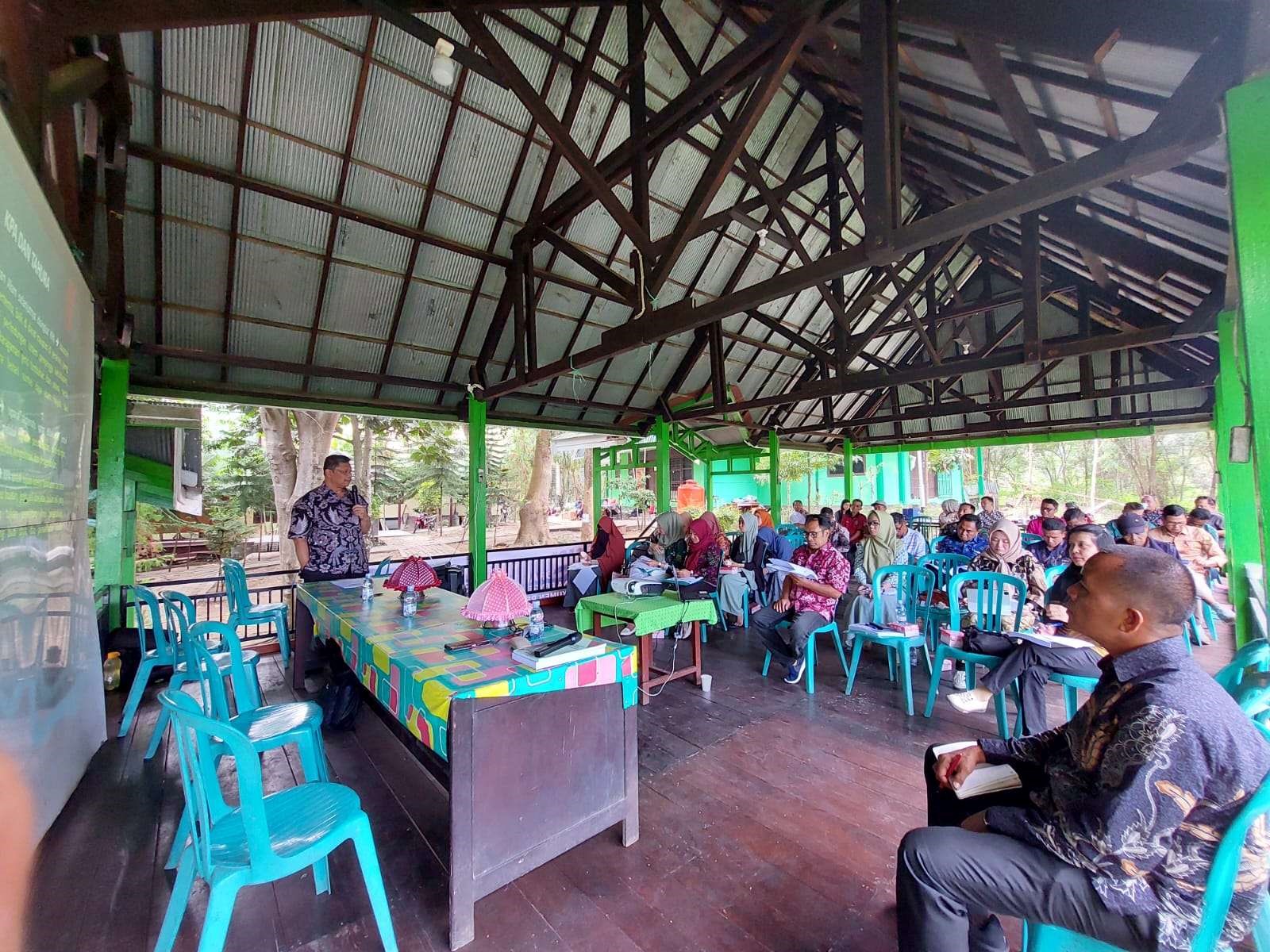FORCLIME
Forests and Climate Change ProgrammeTechnical Cooperation (TC Module)

Select your language

The Southwest Papua Social Forestry Working Group (Pokja PPS) was established last year through Decree of the Governor of Southwest Papua and subsequently prepared the 2024 Pokja work plan. As the end of 2024 is rapidly approaching, the Pokja PPS, led by the Provincial Environment, Forestry and Land Service (DLHKP) and supported by FORCLIME, held a coordination meeting in Sorong, the capital of Southwest Papua Province on 27 September 2024. The meeting was attended by the Pokja PPS membership, the Head of the DLHKP, Mr. Julian Kelly Kambu ST., M.Sc., the Head of the Center for Social Forestry and Environmental Partnerships (BPSKL) for Maluku and Papua, Mrs. Lilian Komaling, S.Hut., M.Sc., the Director of Social Forestry Business Development at the Ministry of Environment and Forestry (KLHK), Mrs. Catur Endah Catur Endah Prasetiani and by Expert Staff Member of the Governor of Southwest Papua for Economics and Development, Mr. George Yarangga.
The purpose of this meeting was the preparation of the 2025 Pokja PPS Work Plan and the synchronization of this work plan with programmes organized by development partners and FORCLIME, the implementer of the bilateral programme between Indonesia and Germany currently operating within the Province of West Papua. During the meeting, Mrs. Catur Endah Prasetiani launched the Social Forestry programme of the Province of West Papua.
Following the meeting, each Pokja PPS work unit, specifically: Acceleration of Social Forestry Access; Business Development and Partnership; Mentoring; and Advocacy, Communication, Monitoring and Reporting, will hold a series of meetings with the DLHKP and BPSKL in order to complete the 2025 Pokja PPS Work Plan matrix.
For more information, please contact:
Otniel Effruan, Adviser for Forest Management and Conservation Southwest Papua Barat
Mohammad Sidiq, Strategic Area Manager for Sustainable Forest Management and Coordinator for Tanah Papua

The forest inventory is a method that is used in order to collect data on forest cover, tree species, non-timber resources and the various broader ecosystem services that are provided by forests. In order to develop regulations on forest inventory through the issuance of a ministerial decree, the Directorate General of Forestry Planning and Environmental Management (PKTL) at the Ministry of Environment and Forestry (KLHK) through National Forest Inventory Working Group 2.0 (IHN 2.0), supported by FORCLIME, held a discussion in Jakarta on 13 September 2024. The meeting was attended by members of the Working Group who were representing the five Sub-Directorates of the PKTL. The discussion, which was led by the Head of the National Forest Inventory Working Group, Hanifah Kusumaningtyas, S.Hut., M.S.E., aimed to develop a legal framework that will be used as the basis for the implementation of the IHN 2.0 Technical Guidelines through the issuance of a ministerial decree. This decree will complement Ministerial Regulation No. 7 of 2021 on Forestry Planning, Changes in the Designation and Function of Forest Areas and the Use of Forest Areas.
National Forest Inventory 2.0 (IHN 2.0) is a new approach to forest inventory designed to meet the growing data requirements associated with modern forest management. As forest management policies evolve, demand for information beyond timber volumes, such as forest carbon stocks and other critical data, is increasing. IHN 2.0 covers a range of forest types such as Customary Forests and Rights Forests, as well as non-timber forest resources and socio-economic factors related to forest communities. Forest inventory is now set to shift from a national scale to provincial management, reflecting the decentralization of forest management responsibilities.
IHN 2.0 aims to update and improve the methods and technologies used in forest inventory to ensure that the data obtained is more accurate, up-to-date, and supports better decision-making. This is a strategic step to improve data and information on forest resources, which ultimately supports sustainable natural resource management.
In the wake of this meeting, the draft version of the ministerial decree on the national forest inventory will be finalized. In addition, the IHN 2.0 Technical Guidelines will also be refined with an eye on their eventual implementation in 2025.
For more information, please contact:
Fadhilatunnisa Nurhadiza, Junior Adviser for Sustainable Forest Management
Mohammad Rayan, Technical Adviser for Cross-Cutting Issues and Conflict Management
Wandojo Siswanto, Strategic Area Manager for Forest Policy and Climate Change

Forest Park or Tahura is a conservation area that is managed by the local regional government. According to Law No. 50 of 1990, Tahura comprises a nature conservation area, one of the purposes of which is the collection of natural and non-natural plants and animals of both native and non-native species. These are subsequently utilized for research, scientific, educational, supporting cultivation, cultural, tourism and recreational purposes.
The Central Sulawesi Grand Forest Park (Tahura Sulteng) is located in Sigi Regency and Palu City, while its management is the responsibility of the provincial government, in this case the Regional Technical Implementation Unit (UTPD) of Tahura Sulteng. The purpose of managing Tahura Sulteng is to develop the area into a center for plant and animal collections so that it becomes a zone that the people of Central Sulawesi can be proud of. Tahura boasts a diversity of flora and fauna, including 159 types of vegetation (that include 100 types of trees, 13 types of grasses, 22 types of lianas, stranglers, epiphytes, saprophytes and parasites, and five types of palms). The dominant species that can be found in this area are sandalwood (Santalun album) and biti (Vitex cofassus). Meanwhile, the Tahura Sulteng fauna comprises mammals, birds, reptiles and amphibians. In 2021, Tahura Sulteng experienced a 1,933 Ha reduction in its total area, based on Decree of the Minister of Environment and Forestry Number SK.6624/MENLHK-PKTL/KUH/PLA.2/10/2021. The park’s current size is 5,195 Ha.
In an effort to improve the Long-Term Management Plan (RPJP) of Tahura Sulteng 2025-2034, the Forestry Service of Central Sulawesi Province, represented by the Head of Forest Planning and Utilization, Mrs. Zulfiany, S.Hut., M.Sc., held a public review on 12 September 2024 at Ngatabaru Village in Sigi Regency. This activity was supported by FORCLIME and was attended by residents and officials from Mantikulore sub-district in Palu City and Sigi Biromaru sub-district in Sigi Regency, as well as a number of officers responsible for order and security in rural areas, specifically Village Guidance Officers (Babinsa) and Community Security and Order Officers (Bhayang Bhabinkamtibmas).
During the meeting, the Ngatabaru Village community voiced its ambition for UPTD Tahura Sulteng, in its role as manager, to maintain the current area of the park. Another proposal, this one submitted by FORCLIME, related to the inclusion of gender mainstreaming in the RPJP document in line with Presidential Instruction Number 9 of 2000 on Gender Mainstreaming During National Development, which was ultimately realized as P.31 of 2017 on Guidelines for the Implementation of Gender Mainstreaming Within the Environmental and Forestry Sector. This proposal is aiming to optimize gender mainstreaming efforts across all program and activity planning, preparation, implementation, monitoring and evaluations within the environmental and forestry sector. The hope is that the RPJP Tahura Sulteng document will incorporate gender-responsive planning and budgeting.
As a follow up to the input received during this public review activity, UPTD Tahura Sulteng will incorporate the various suggestions and input received from participants during the meeting into the Tahura Sulteng Long-Term Management Plan Document, as well as consult with related parties, including the Ministry of Environment and Forestry.
For more information, please contact:
Muhammad Yusuf, Adviser for Social Forestry and Sustainable Forest Management
Ismet Khaeruddin, Senior Adviser for Biodiversity Conservation and Provincial Coordinator for Central Sulawesi
 |
Supported By: |
  |